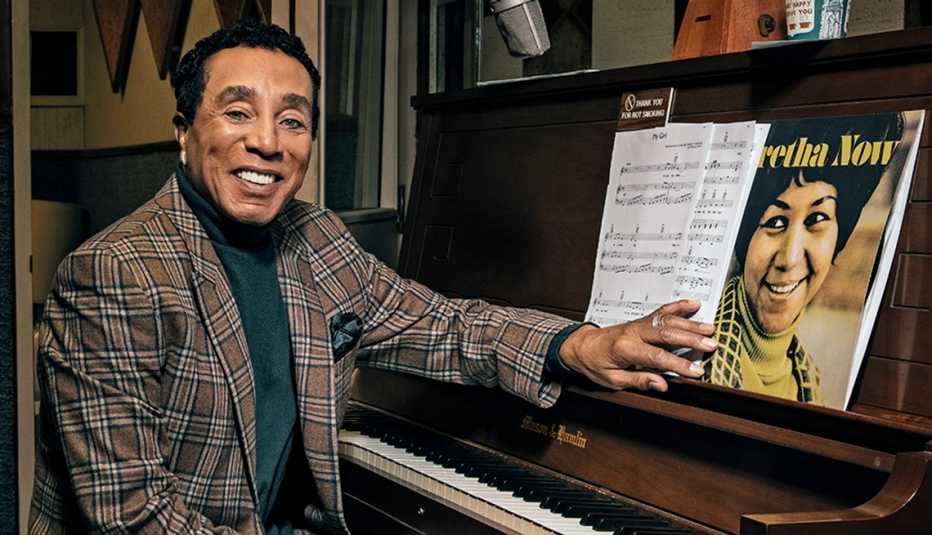AARP Hearing Center




In the beginning there was Berry Gordy, the founder of Motown records, a writer and producer of popular music that he hoped would one day reach all of young America, a man known for his impeccable ear and relentless drive. So it’s not surprising that the second act Gordy signed to his label was William “Smokey” Robinson, a teenage composer, and his singing group, the Miracles.
Like Gordy, Robinson was a prolific creator — he’s now credited with more than 4,000 songs and dozens of Top 40 hits, including “My Girl” for the Temptations, “My Guy” for Mary Wells and “Ain’t That Peculiar” for Marvin Gaye. But Robinson also went on to sing many of the timeless hits he created: “The Tracks of My Tears,” “I Second That Emotion” and “The Tears of a Clown,” for openers. He also became a Motown vice president, producer and talent scout. The image of Motown to this day is tied up with the image of Smokey Robinson — both are associated with class and taste and the ability to cross over to white audiences without ever losing the love and admiration of black fans.
Robinson has earned his place in the Rock & Roll Hall of Fame and the Songwriters Hall of Fame and has been honored by the Kennedy Center. Two years ago he received the Library of Congress’ Gershwin Prize for Popular Song. These days his voice remains sweet and strong — he’s still recording and performing; in February and March he’ll be playing four shows at the Wynn resort in Las Vegas. At 78, he says he’s healthy and happy. When he’s not singing, he’s doing yoga, eating vegan or playing golf. In October we invited music journalist Touré to interview the Motown legend. Robinson was eager to talk about his role in the label’s history but was still mourning the August death of his friend, Queen of Soul Aretha Franklin — they’d known each other since she was 6 years old and he was 8 — so we’ll start there.
How are you feeling now about the loss of Aretha?
I’m still in recovery mode, because I love her and I’m going to miss our conversations and our getting together. But I know that spiritually she’s in a better place. She was suffering at the end there, and I don’t ever want to see her suffer. So now she’s cool, and I’m cool ’cause she’s cool.
You and Aretha grew up in Detroit, along with lots of stars — Jackie Wilson, Martha Reeves, Diana Ross, Mary Wells and more. The Detroit you grew up in was so musically fertile.
There were thousands upon thousands of talented people there. We used to have group battles on the street corners. There were groups that would outsing me and the Miracles.
But other cities are loaded with good musicians. What was different about Detroit and your era?
Berry Gordy. I believe there are talented people in every city, every town, every township, every village, every nook in the world. But Berry Gordy gave us an outlet.
What was unique about Berry?
He was a music man. When I met him, he was writing songs for Jackie Wilson and other people like that, and he was a record producer. Back in those days, especially if you were black, nobody was paying you what you should be paid, if they paid you at all. So Berry decided to start his own record company and gave us that outlet.
Some record execs succeed because they have the ears and some because they can make the business work.
Most record companies, back then, were run by lawyers or guys who just wanted to go into the record business for a hobby or something. But we had a music man at the helm. Somebody whose first love was music and producing records and writing songs. So that was a real asset for us.
Did he help you become a better songwriter?
Absolutely.
What did he teach you?
How to make my song be one idea. When I met Berry, the Miracles had gone to an audition with Jackie Wilson’s managers. Berry was there that day to hand in some new songs. We sang five songs I had written. Jackie Wilson’s managers didn’t like us at all, but after they had rejected us, Berry came out and said, “I liked a couple of your songs, man — where did you get them from?” I had 100 songs in a loose-leaf notebook. But most of them were haphazard, because my first verse had nothing to do with my second verse.




































































More on Entertainment
The Best Baseball Documentaries to Stream Now
Watch docs from Ken Burns, Spike Lee, ESPN and more